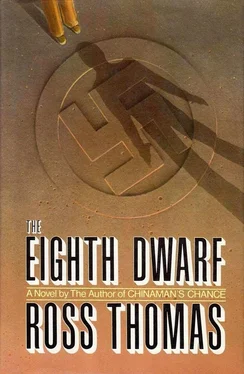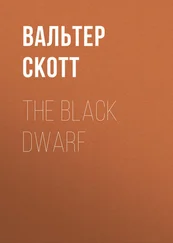Jackson mixed two drinks. He handed one of them to Von Staden, who accepted it silently. When he handed Baker-Bates his, Jackson nodded toward Von Staden and said, “Doesn’t he ever shut up?”
“He’s a watcher, not a talker. You should’ve taken my advice and stayed away from Ploscaru.” Baker-Bates looked down at the dwarf. “He’s a treacherous little sod — aren’t you, Nick?”
“All Romanians are,” Ploscaru said with another cheerful smile. “It’s in our blood. But let’s talk about what we’re all interested in. Let’s talk about Kurt Oppenheimer. Tell us why you’re really interested in him, Gilbert.”
“You know why,” Baker-Bates said. “Because we bloody well don’t want him in Palestine.”
“I mean your real reason. No need to be shy; we’re all friends here.”
“You just heard it.”
“But that’s the public reason, Gilbert. Now tell us the private one — the one that scarcely anyone knows.”
“There is no private one, as you call it.”
“No? How strange. I thought there was. I mean, one can understand why you wouldn’t want Oppenheimer in Palestine. But with the Empire crumbling all about you, I thought there would be several spots where you could use a man of his peculiar talents. Greece, for example; Malaya; even India. I mean places where a spot of judicious killing might be in order.”
Baker-Bates stared down at the dwarf for several moments and then smiled, but it was a thin, tight-lipped smile without humor or teeth. “I’d almost forgotten how absolutely mad you really are, Nick.”
The dwarf shook his head and smiled reasonably. “No, not really. A trifle neurotic perhaps, but then, I have reason to be. Now, we know for a fact that the Russians want poor Oppenheimer. And the Americans, too. And I assume that both would pay a modest sum to whoever might deliver him into their eager hands. But what about your people, Gilbert? How much would they bid if he were, so to speak, offered up to them on a silver platter?”
“How much?”
“Yes. How much.”
“Nothing,” Baker-Bates said, putting his drink down. “Not a penny.”
“What a shame.”
Baker-Bates shook his head slowly. “Don’t try it, Nick. Don’t try it or we’ll step on you the same way that we’d step on a bug.” He paused. “A small bug.”
He turned and started for the door. Von Staden moved over quickly and opened it. But Baker-Bates turned back to stare for a long moment at Jackson. The Major nodded at the dwarf. “You can’t trust him, you know. You really can’t.”
Jackson smiled. “I know.”
As soon as Baker-Bates had gone, Ploscaru put his drink down, reached into a pocket, brought out a large wad of German marks, and put them on a table. He then reached into another pocket and brought out another wad. He kept on doing this until the table was almost covered with money. After that he looked up at Jackson and said, “Bait.”
“Bait?”
The dwarf nodded. “For our trap.”
“Of course. Hell yes. Why didn’t I think of that?”
Ploscaru smiled. “You’re not quite with me yet, Minor.”
Jackson turned to the bottle and poured some more whiskey into his glass. “I didn’t think it showed.” He turned back. “Tell me.”
“We’re going to be quite busy this afternoon and evening.”
“Doing what?”
“Why, baiting our trap.” Ploscaru used a forefinger to stir the marks around. “This is what we were paid for the contents of the cellar this morning. There are approximately one hundred thousand German marks here — about five hundred American dollars. Provided, of course, that we could change them for dollars, which we can’t. Still, one hundred thousand marks is quite a tidy sum, and that’s what we’ll offer.”
“What’re we buying?”
“Betrayal.”
“From a Judas, I take it.”
“Yes, I suppose you could say that.”
“Who’ll sell out Oppenheimer.”
The dwarf looked at Jackson surprised. “Oh, heavens, no. I’m sorry, Minor, but you do have such a logical mind. We really must work on that when we get the chance. But for now, let’s start from Square One. What facts do we have?”
“Hardly any.”
“No, we have several. The first is that somewhere in either Bonn or Godesberg is young Oppenheimer’s next intended victim, right?”
Jackson nodded.
“Good. Now, if I recall what you told me correctly, we have a partial address for that victim.”
“You mean what that American officer in the Opel plant remembered?”
“Yes.”
“That’s no partial address.”
“A fragment, then. It was a low number, wasn’t it — in the teens?”
Again, Jackson nodded.
“And it was on Something-strasse.”
“That’s right.”
“Now, just who do you think young Oppenheimer’s next victim will be?”
“I haven’t the faintest idea.”
Ploscaru shook his head in mild exasperation. “Of course you do.”
“Okay. He’d probably have been a Party member with something to hide.”
“A reasonably high party member — one who had the necessary funds to buy his new identity. Or hers. It could be a woman. Now, then: before the war, what were Bonn and Godesberg noted for?”
“Not much.”
“Exactly. Not much. They were both quiet places with hardly any industry; particularly suitable for what?”
Jackson shrugged. “Okay, what?”
“Why, retirement, my boy. Retirement. Many people, even a number of British, retired here simply because it’s such a somnolent place.”
“Dull.”
“Indeed. Dull. Now, then: what does retirement suggest?”
“Age?”
“Good. But something else, too. Money. You have to have money to retire here comfortably. Quite a bit of money, in fact. Now, we can safely assume, I think, that young Oppenheimer’s intended victim has money and that he or she is living comfortably and privately. Privacy, of course, suggests a house, possibly even a villa. So, our search is narrowed to someone who lives quite comfortably and privately in a house or villa with a low number in the teens on Something-strasse.”
“Or in one room up in a garret. It could be that way too, Nick. Your theory’s fine up to a point. But it could be that whoever bought his new identity from that guy who was selling them — Damm, wasn’t it? Well, maybe he or she had only just enough money for that and nothing else. Take that interpreter at the Opel plant, for instance. He didn’t have any money.”
Ploscaru shook his head. “Anonymity, Minor. You’re forgetting anonymity. Without money, a big city is best for that. With it — well, with it you swim with the other fish: one retired person among many. What could be more anonymous?”
Jackson grinned. “It’s all hunch, isn’t it, Nick?”
The dwarf thought about it for a moment and then shrugged. “I prefer to call it intuition — with a strong underpinning of facts.”
“Or guesses.”
“All right. Guesses. But here’s something that we don’t have to guess about. And that’s the sheer joy and delight that the average German finds in assuming the role of informer. They positively dote on it, you know. Children turn in their parents; wives their husbands; brothers their sisters, and so on. They do it for money, for revenge, for personal gain, and probably just because it makes them feel good. During the war, informing was almost a major industry. It still is, except that now they inform to the Americans or the British or what-have-you, because if they do, they might get the job or the room of the person they inform against. So that’s what we do this afternoon. We go looking for informers.”
Читать дальше












